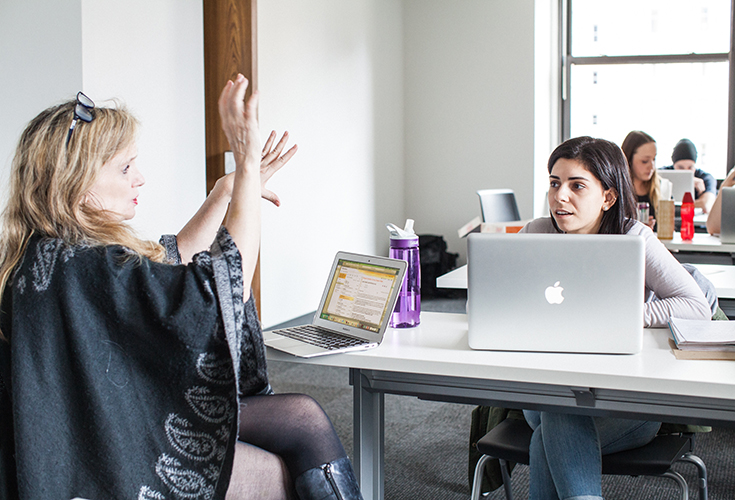Move Over Moodle, Canvas is Coming
 The shift to Canvas will make “face-to-face time in the classroom ... much more collaborative and student-focused," says Dolores Marek, director of academic technologies. Photo: Phil Dembinski '08
The shift to Canvas will make “face-to-face time in the classroom ... much more collaborative and student-focused," says Dolores Marek, director of academic technologies. Photo: Phil Dembinski '08A messy whiteboard, a cluttered notebook, fingers quickly typing on laptops: signs of a productive classroom where learning is encouraged, facilitated and celebrated. But as technologies evolve, how will our classrooms change?
The answer, for now, depends on mobile. Canvas Learning Management System (LMS), an LMS that works equally well on a phone or tablet as a computer screen, will replace Moodle, Columbia’s current LMS, by Fall 2018. (However, Canvas is coming to Columbia in Fall 2017 to be piloted by faculty groups throughout the next academic year, and to give time to transition all Moodle data over to Canvas.)
“Your student’s on the train, he can do his homework,” says Dolores Marek, director of academic technologies at Columbia. “You’re in the car, you can give feedback.”
“Hopefully while you’re not driving the car,” says Byron Nash, associate vice president of technology services. Marek and Nash have partnered closely with Academic Affairs to transition Moodle to Canvas over the course of the next 18 months. More importantly, however, the partnership has guided the way technology can better support student learning in and out of the classroom.
So what else will faculty be able to do while not driving a car?
- Post video critiques on a student’s submission
- Annotate student essays in real time
- Post a lecture from last semester and ask students to submit questions before class
- For the late nighters: call Canvas support 24 hours a day, 7 days a week
Because Canvas’s features are included in a single app, faculty and students will spend less time clicking, finding or creating materials and more time learning. “Face-to-face time in the classroom will be much more collaborative and student-focused,” says Marek. “It’s about having more meaningful work done in the classroom.”
The new technology will provide faculty with robust analytics on student progress during the course. “It offers a new opportunity for our instructors to talk about how we teach,” says Brendan Riley, an associate professor of English who’s already looking forward to using the new LMS. “Such introspection is always productive.”
Canvas will be used for new online courses as well, but the messy whiteboards and cluttered notebooks of Columbia aren’t going away. “With the implementation of Canvas, all these great tools will filter into the physical classroom,” says Marek.
So what’s the future of teaching technology? Marek sees it involving classroom layouts and interiors, things we don’t always associate with technology. “Learning and collaborative spaces will be one of the areas to consider when we start looking at classroom design and learning technologies,” she says. “Furniture, lighting, projection and touch screen monitors. These technologies, in addition to Canvas, are all part of the learning process.”
While Marek and Nash are busy looking forward, they’re also looking at the bigger picture: Columbia’s success. “This is a concrete example of a goal tied to the Strategic Plan,” says Nash. “A 21st century curriculum should be developed on a 21st century tool.”
Ames Hawkins, associate provost of faculty research and development, has been collaborating with Marek’s team to ensure faculty are supported throughout the transition. "It isn't a question of whether or not one uses digital technology in the classroom,” says Hawkins. “The questions are: How can we best facilitate student learning? What type of user are you? This isn't a one-size-fits-all scenario. In working with pilot groups we can develop a range of workshops for faculty that best address the intersection between their interests and needs, in the context of current, relevant critical digital pedagogy best practices."
Special note for faculty members: More information on the Canvas LMS, opportunities to participate as an early Canvas user and more will be shared in the coming week from Provost Wearden and Associate Provost Hawkins.